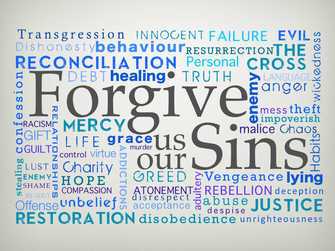
We all know that this is part of the prayer that Jesus taught His disciples when they asked Him to teach them to pray. This is a prayer that is recited and sung at thousands of churches on Sunday and other days. It’s a prayer that we teach our children and one of the first things we teach new Christians. A couple of verses later in the prayer we see that the debts that Jesus was talking about are sins or trespasses against God.
Matthew 6:14-15 (NKJV)14 "For if you forgive men their trespasses, your heavenly Father will also forgive you.15 But if you do not forgive men their trespasses, neither will your Father forgive your trespasses.
Matthew 6:14-15 (BBE)14 For if you let men have forgiveness for their sins, you will have forgiveness from your Father in heaven.15 But if you do not let men have forgiveness for their sins, you will not have forgiveness from your Father for your sins.
We know that when we confess that Jesus is Lord, that He is the Son of God, and that He has died to pay the penalty of our sin that we are saved and have eternal life with God. However we may not know how significant that asking for forgiveness of debt was to the people that Jesus was talking to at that time. The power of that request is described in the following excerpt from the YouVersion Reading Plan, The Prayer That Turns The World Upside Down provided by Thomas Nelson from the book The Prayer That Turns the World Upside Down: The Lord's Prayer as a Manifesto for Revolution written by R. Albert Mohler, Jr.

Forgive Us Our Debts
While many Americans view debt as an annoyance, in the ancient world debt was punishable by prison sentence. In the Roman Empire, prisons were not generally filled with criminals; they were populated with debtors. Most convicted criminals were executed or were forced to serve some other form of punishment for their crimes, but those who could not make good on their payments were incarcerated until they could pay what they owed. This system was meant to put pressure on the families of the incarcerated debtor to find the necessary money to pay their debts to free their loved one from prison.
In the Roman Empire, then, debt typically meant severe pain and tragedy for an individual and a family. In our day we experience frustration and anxiety with debt, but in the days of Jesus debt was a matter of life and death. This is the context in which Jesus teaches us to pray “forgive us our debts as we forgive our debtors.” Jesus’ use of the word debts is meant to evoke in our mind both a serious offense and a corresponding serious punishment. To be forgiven a debt was no mere trifle, but an act of extravagant mercy.
If the petition “give us this day our daily bread” emphasizes our most urgent physical needs, the petition “forgive us our debts” emphasizes our most urgent spiritual need. Saying we owe a debt to God means that we have failed to give him the obedience he is rightly due. We owe God our obedience, and we have failed to pay up. Thus, as sinners, we stand before God condemned, rightly deserving his just wrath. Only God’s forgiveness can clear our guilt and establish a meaningful relationship between God and us.
This petition reminds us that the Lord’s Prayer is not a casual prayer for the generically religious. This prayer is a gospel prayer. We can only say these words and ask these things of God when we stand on the finished, atoning work of Jesus Christ. Indeed, this petition demonstrates that the theological rock bed of the Lord’s Prayer is nothing less than the gospel. We can only rightly pray the Lord’s Prayer when we recognize that we are deeply sinful and only God’s grace in Christ can remedy our souls.

 RSS Feed
RSS Feed